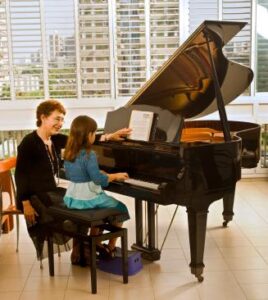 This is an age-old question. If you have accepted a student into your studio roster who doesn’t really want to learn to play the piano then there are often challenges in the lessons. It may not be apparent at first who is wanting the lessons to occur — the student, or the parent. But often, if the parent wants the child to learn to play the piano, but the student does not, then problems will emerge during the lessons, or at home with practice time, or both.
This is an age-old question. If you have accepted a student into your studio roster who doesn’t really want to learn to play the piano then there are often challenges in the lessons. It may not be apparent at first who is wanting the lessons to occur — the student, or the parent. But often, if the parent wants the child to learn to play the piano, but the student does not, then problems will emerge during the lessons, or at home with practice time, or both.
Students may present as stubborn, uncooperative, non-communicative, resistant, or totally disengaged. Parents may inform the teacher that the student will not practice or will fight with the parents about practicing.
It is possible, though unlikely, that a teacher can entice a student who doesn’t want to learn, to become a great and engaged student. The real issue and challenge in this situation actually lies between the student and the parent. And so it is often impossible for the teacher to be able to resolve the issues and problems in the piano lessons.
 As the teacher, you will not likely know all of the various family dynamics at play in this situation: Has the student told the parent they don’t want to play? Is the parent insisting that the student learn over the student’s objections? Does the student want to please the parent, but rebel by appearing to be too stupid or incapable with lessons? Etc. The psychology of a student, or the family dynamic, is beyond what the average piano teacher is equipped to manage, or should even attempt to resolve.
As the teacher, you will not likely know all of the various family dynamics at play in this situation: Has the student told the parent they don’t want to play? Is the parent insisting that the student learn over the student’s objections? Does the student want to please the parent, but rebel by appearing to be too stupid or incapable with lessons? Etc. The psychology of a student, or the family dynamic, is beyond what the average piano teacher is equipped to manage, or should even attempt to resolve.
Often in scenarios such as this, it is likely to end in a termination of lessons for that student. Of course, teachers will feel concerned that the student will take it as a personal failure or feel that the teacher does not like them (worrying about harming a fragile sense of self in the student), or other situations like this. But, it is important to remember the role each person in this teacher-student-parent relationship has:
- The job of the teacher is to find students who desire to learn, and then to teach piano to the best of their ability within a positive environment of encouragement.
- The student is to come ready and willing to learn, to listen and follow instruction from the teacher. In other words, the job of a student is to learn.
- And the parent is to prepare their student for lessons through information, instruction, and communication. Once a student begins lessons, then the parent is to pay for the lessons, ensure that the student attends lessons, and to support the student at home through providing emotional encouragement, an appropriate practice environment, and times when a student can appropriately practice.
In other words, it is not the piano teacher’s responsibility to try to become an armchair psychologist (outside of the role of teacher). It is not the responsibility of the teacher to repair family dynamics. Nor, is it the teacher’s responsibility to get the student to love playing the piano. The teacher is just to teach.
 However, keeping all of this in mind, here are some ideas to use in your studio if you have a student you are trying to teach who does not want to learn piano. Try to:
However, keeping all of this in mind, here are some ideas to use in your studio if you have a student you are trying to teach who does not want to learn piano. Try to:
- Increase the amount of FUN that happens during lessons. Provide students with MANY opportunities for small successes and immediately provide positive feedback and rewards. Check out some great ideas here.
- Use LOTS of games in your teaching to keep the activities fun and light-hearted and exciting. Check out game ideas here.
- Teach music more than piano specifically. In other words, teach musical concepts away from the keyboard. Teach things such as rhythm, music history, music theory, music terminology, introduction to a wide variety of musical styles (Gregorian chant, baroque, classical, jazz, hip-hop, etc), basic music conducting, and other activities such as these. You can have the student practice concepts through worksheets and activities, or introduce them to new ideas with visual aids and pictures. Find some of these for your studio here.
- Find out more about what your student does like and then (if possible) try to relate piano lessons to those items of interest. For example, if your student loves ballet you can relate piano form, technique, musical styles, etc to barre work, technique, ballet stories, etc. Or if the student loves sports then relate piano technique to soccer technique or basketball drills, etc. Things like that. You can also customize rewards and incentives to those likes (such as soccer themed stickers, etc).
- Have the student do cooperative piano playing, such as group lessons or duets with another student. Make piano lessons a fun, social activity where friendly competition and comradery aids the student’s desire to improve. Make sure to carefully pair students together who are kind and friendly and likely to work well together.
- Talk to the parents. See if you can find out more information about the desires of the student and of the parents. Speak openly and kindly about the situation and seek to gain more information that may help you with the student during lessons. And, if all else fails, supportively encourage the parents to consider the student’s desires not to learn piano. And recommend that this student be allowed to choose whether to play the piano or not (since refusing to participate in lessons, or to practice at home, will result in little to no tangible gain in learning piano anyway).
It may ultimately require the teacher to make the tough decision to let a student go. But even in doing this, it can be done with love and encouragement for the student. Give the student a “see you later” gift. You can include a card, treats, activities (legos, puzzles, etc) or fun items (stickers, pencils, racecars, miniature dolls, etc). Parting doesn’t have to be a bad thing. Sometimes ultimately it is for the best.
For more information and ideas, check out our Teachers section on the website.